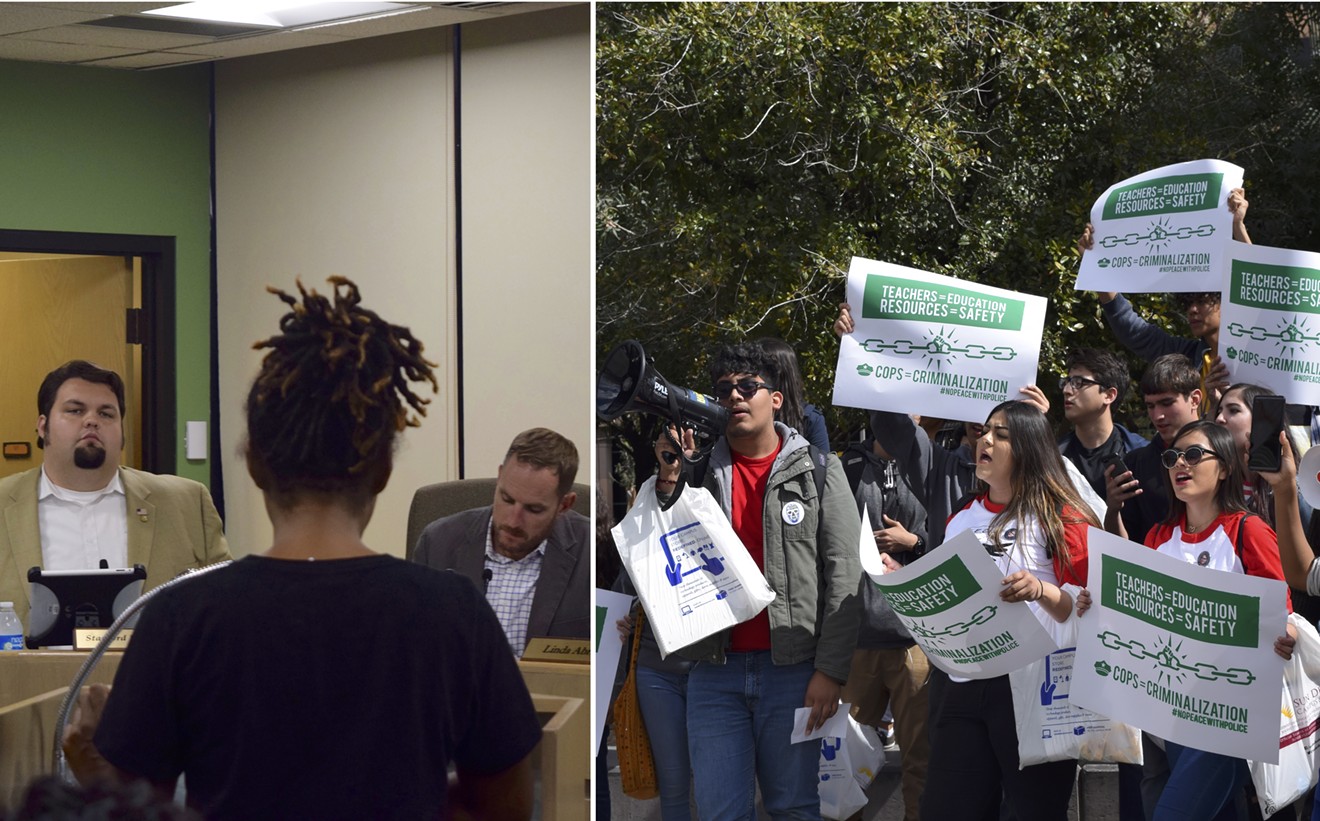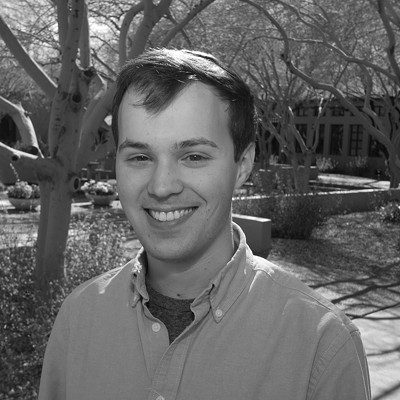Students had a rapport with the uniformed cop at the south Phoenix public school back then, Aros said. But recently, she started viewing the officer differently, ever since getting involved with immigrant-rights organization Puente around two years ago.
"I know not only I, but a lot of my friends get really anxious when they see a gun," Aros explained. "Just because what we've learned from guns is that they go off."
Aros started hearing about confrontations between these campus cops – known as school resource officers – and students. She thought about how a badge represents power, and how power can be abused.
And these days, 16-year-old Aros is working with Puente to demand that the district remove all armed personnel from campuses.
"We're not trying to kick out the SRO," Aros said in an interview on Wednesday at Puente's office near the State Capitol. "It's the whole thing of having the gun on campus. It's not okay for our mental state and well-being."
An avid math student, Aros wants to become a psychiatrist who specializes in working with LGBTQ teenagers. In an adjacent room, activists were making signs opposing campus cops in advance of a district board meeting the next day.
Puente's #CopsOuttaCampus campaign launched in May of last year. But recently, the campaign has acquired new urgency.
After the Parkland, Florida, school shooting in February, President Trump endorsed an NRA idea to arm certain trained teachers. Arizona Governor Doug Ducey released a plan that included more funding for school resource officers in response to fears about school safety. His plan, however, never made it out of the state Legislature.
For the past several months, activists have pushed back on these proposals, asking the Phoenix Union High School District governing board to remove armed personnel from schools. They say that disciplinary policies enforced by campus cops disproportionately target students of color, contributing to a school-to-prison pipeline.
Frustrations are mounting. During a two-hour discussion at Thursday's PUHSD governing board meeting, several dozen people affiliated with Puente, Poder in Action, and March for Our Lives reprimanded officials.
They demanded that board members do more to end guns on campus, urged them to listen to the community's concerns, and criticized a plan to hire armed "safety and security specialists" for the district.
Activists say that the district's plan makes no sense. They argue that an armed security staffer – who might also be a reserve police officer – is just an SRO by another name.
PUHSD recently lost three SROs. A three-year federal grant known as Community Oriented Policing Services, or C.O.P.S., allowed the Phoenix Police Department to assign more SROs. After the grant was phased out this summer, it reduced the number of SROs across PUHSD schools to nine.
Partly in response to the end of the C.O.P.S. grant, PUHSD is seeking to modernize its security strategy. Last month, the district approved the Next Gen Safety and Security Plan, which calls for a reduced number of SROs and upgraded security measures. The district is also trying to incorporate restorative justice – a model for scaling back the use of suspensions and expulsions in favor of dialogue and students taking responsibility for their behavior.
Under the district's plan, the number of SROs could be reduced to six or even three, depending on school safety needs and whether the pilot effort is successful.
Activists disagrees on several key elements. This week, Puente sent a formal list of proposed amendments and revisions to the plan.
Where the district would like to decrease the reliance on SROs as a school safety component, Puente wants SROs to be eliminated. Where the district states that an objective of the plan is to enhance campus life and care of students and staff through "social and emotional wellness," Puente would like the district to commit to restorative justice.
According to the latest version of the PUHSD plan, the district will hire one or more security specialists: non-uniformed, sworn peace officers who would be employed by the district, not the Phoenix Police Department. The security specialist would conduct active shooter training sessions and serve as a liaison with law enforcement.
The security specialist could be armed in order to prevent a tragic school shooting, but his or her weapon would be concealed, according to the Next Gen plan.
There has not been a recent high-profile violent incident between a Phoenix school resource officer and a student. But last month, four students in Apache Junction, a neighboring city east of the Valley, were arrested after one of them refused to take off his bandanna in a confrontation with a campus police officer.
Moreover, police in Arizona must ask suspects about immigration status under SB 1070. Combine the controversial law with the Trump administration's broad immigration crackdown, and Arizona campus cops are a locus of great anxiety.
Though frightening mass shootings seem to happen on a regular basis in American schools, school shootings are actually less common now than they were in the 1990s. Still, the public is hyper-aware of campus tragedies because of the media coverage that follows, and as a result, parents and administrators want to safeguard school grounds.
Resha Gentry-Ballance, the classroom teachers' association president for PUHSD, said that many teachers support keeping SROs on campus.
"We fear the outside world," she said. "We’re not concerned about our kids — we don’t feel threatened by them. But we do feel like we need protection from the outside world that might come on our campus and influence our campus."
"That would be our concern," she added. "If [the SROs are] gone, what then?"
Gentry-Ballance empathizes with the concerns of the activists. But contrary to their claims, she said, there is no significant friction between Phoenix SROs and their students, much less a single violent incident. And the accusation that district staff and board members are ignoring the activists isn't true, she said.
“I just feel like they keep saying, ‘You’re not listening,’" Gentry-Ballance said. "What they mean is, you’re not doing what we want.”
Puente counters that SROs haven't been an effective countermeasure to prevent gun violence in schools. “SROs haven’t been the first to the front lines for those interventions," said Maxima Guerrero, the lead organizer of the #CopsOuttaCampus campaign.
The Parkland massacre threw a spotlight on that problem. During that shooting, a campus police officer stood outside Marjory Stoneman Douglas High School for approximately four minutes while the shooter gunned down students inside. The officer resigned, his actions were criticized, and he was labeled a coward.
Jordan Harb, a student from Mesa and an activist with Arizona's March for Our Lives chapter, told the board on Thursday that schools need more counselors, not armed personnel. “SROs are not reliable, and they’re much more detrimental than they help," Harb said.
PUHSD Superintendent Chad Geston acknowledged some of the concerns. He said that the district has been grappling with the question of whether to arm the security specialist. It's the toughest decision related to school safety, he said.
"We also know that as we've met with other students, teachers, parents, that there are some that feel like that is a safety precaution that they would like to have on campus," Geston said.
He added, "Until there's better gun control outside of schools, we struggle with how to handle gun issues on campuses."
Geston noted that the security specialist job description, as drafted, gives the specialist the authority to carry a concealed weapon, but doesn't require it.
In a victory for the activists, Geston announced that the district is going to remove a requirement that the specialist be a reserve officer with police academy training. Although they serve part-time, reserve officers have the same authority as a full-time officer and serve specialized roles, including in schools as SROs.
Activists objected to employing someone trained as a Phoenix police officer who also has the authority to make arrests. Geston said that it was not their intention to employ someone with the ability to arrest students – they just wanted a security specialist who was highly trained.
"That's something that we've heard loud and clear," Geston said.

Attendees at a Phoenix Union High School District governing board meeting on September 6 demanded that the district remove armed personnel from school grounds.
Joseph Flaherty
But during town hall meetings with community members, Danley said, other people have expressed strong support for SROs. The highly polarized debate has reached an impasse.
"This board is now stuck in this really tough spot – and the administration, in many ways – of like, what do we do?" Danley said. "Because this community is not in alignment."
And although he defended the district against accusations that officials didn't seek community input, Danley also acknowledged that the board "could have and should have done many things differently."
"It's the toughest issue we've faced," Danley said. "And I'm not sure I'm up for this leadership moment."
After the meeting, Guerrero said that it's "a huge improvement" that Geston is willing to remove the reserve status component to the security specialist job description.
It's also a positive step that "the board is now starting to ask questions about what they voted on and passed at the last meeting," Guerrero said. Their activism has forced the board to take the issue of guns on campus seriously, she said.
Nevertheless, the student-activists have no plans to stop.
Aros is working to start a chapter of Puente at South Mountain as a student club. Life would be better without guns and officers on campus, she said, because students could concentrate on their studies. They wouldn't have to worry about an armed officer watching over them in the hallway or the cafeteria.
"Without the weapon, I think it would make us feel safer," Aros said. "And have us not worry so much about the gun and more about what we need to, which is our education."












